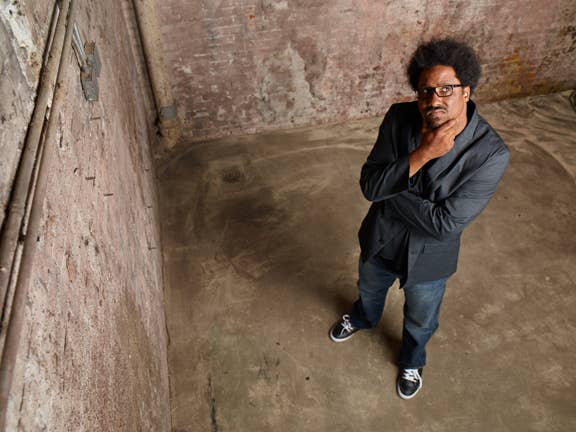
Before comedian W. Kamau Bell showed up on FX last Thursday for the premiere of his new half-hour show, his last television appearance was in 2005, on a Comedy Central show called Premium Blend. In another age, choosing to stay in the Bay Area to work on his one-man show rather than moving to New York or LA would've made that his last real shot at the small screen.
But it's 2012 and one of the most successful comics in the country podcasts from his cat-infested garage. When Bell told me about the show a few months ago, he joked that "the Internet gave me a TV show." Does he still think that? "Well," he laughed, "that definitely sounds like something I'd say."
"I think with my story, there are two versions to tell. One is about the art, the other is the career. It's a story about the 21st century new media landscape," Bell said.
On one hand, Bell got his show the old-fashioned way: by being plucked out of the pile by a star. Chris Rock happened to see Bell perform in 2010 and felt moved to give him an assist. As he told Fresh Air,"If I don't help the smart black guy, who's gonna help him?" On the other hand, Bell never would've put together an act good enough to catch Chris Rock's eye had he not pursued niche audiences, using online word-of-mouth and all of the technological platforms available to the modern comic. Bell now sits in one of the most prime positions for a comedian: Totally Biased with W. Kamau Bell,, his half-hour topical Daily Show-ish comes on right after the iconic Louie.
Bell got his start in Chicago and then moved to the Bay Area in the '90s. After plugging away in standup, going to the big comedy festivals and appearing on Comedy Central, he hit a creative wall: You can only be a "rising star" for so long before the luster fades. So Bell retrenched in 2007 and focused on creating a one-man show. It wasn't designed to get the attention of Hollywood agents, but he built hometown buzz with the one-hour act. Unlike rapid-fire stand-up, it's less a joke-delivery system than a meandering trip around Bell's mind, with PowerPoint slides, personal stories and a focus on race, previously territory mined only superficially in his act.
"I thought, if I were to do some version of this forever, well, there are way worse ways to spend your creative life," he noted.
After that came comedy tours with politically-minded Bay Area comedy friends. Bell's path shows how powerful niche audiences can be in the internet age: The broad standup of his youth had no place as he cultivated fans who were interested in things he was interested in: jokes about 21st century racists, nonsensical immigration laws, strange moments in dating (and marrying) a white woman ("the biggest difference between us isn't that she's white and I'm black — it's that she's Catholic and I'm sane").
"The internet helped comedy become like music. People don't say 'I like standup' — people are talking about the kind of comedy they like. The more that has happened, the more that helped me," said Bell. "The most annoying thing someone can say is, 'I like all kinds of music.' Well... that means you really don't like music."
With this in mind, what is the benefit, artistically and otherwise, of going old media? Reach, money, resources. "It's still a thing that we coalesce around the TV. You're going to get more people in a concentrated time than a computer," Bell explained. "It's still the TV. It's still the hearth."
There's also the large chasm between internet famous and TV famous. Bell, who sounded quite tired during our phone conversation, is just now experiencing the first whiffs of TV fame: He's now recognized on the streets of New York, although nothing like what walking around with Rock was like: "People acted like they'd seen a ghost. A really foul-mouthed ghost." Even so, he's stayed off of Twitter and Facebook to avoid reviews of the show's first episode, as he's still in the midst of shooting the six-episode mini-season.
"I do want to be accessible," he explained. "But I don't want to be tempted to, as they say, feed the trolls." After his six-episode run, Bell would love to be on the air this fall, during the election. But if he had to go back to the Bay Area and continue doing his thing, keeping up with his podcast with "Living Color" musician Vernon Reid, would be okay too.
"This is crazy that I get a show. Crazy. If it doesn't work out, I'm glad to have the opportunity. I'm living in the bonus round."


